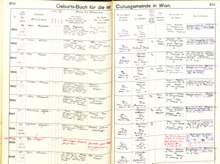Norbert Schiller (actor)
Norbert Schiller (born November 24, 1899 in Vienna ; died January 8, 1988 in Santa Barbara , California , USA ) was an Austrian-American theater and film actor , director and author .
Life
Norbert Schiller completed his acting training at the Academy for Music and Performing Arts in Vienna from 1920 to 1921 and made his debut at the Burgtheater Vienna . From 1921 to 1922 he played at the Lübeck City Theater. Then he was an actor at the Frankfurter Schauspielhaus until 1928 and at the Renaissance Theater Berlin from 1928 to 1931 as well as a guest actor at the Staatliches Schauspielhaus Berlin. In the 1932/33 season he was at the Rose Theater Berlin, 1933/34 guest director at the Stadttheater Bern and also in 1934 director with the Jewish Cultural Association of Rhine-Ruhr and actor with the Cultural Association of Rhine-Main. From 1934 to 1936 he was an actor and again director at the Stadttheater Bern, in 1935/36 and 1937/38 as a guest director at the Städtebundtheater Biel-Solothurn. He also staged at the of Max Röthlisberger founded Boys Bern stage . In addition, he wrote a number of essays and drama, including until 1933 for the Berlin cabaret Die Katakombe .
He emigrated to the USA in 1939. There he worked in Leopold Jeßner's production of Schiller's Wilhelm Tell in 1939 for the Continental Players in the El Capitan Theater Hollywood. He was also an actor on Walter Wicclair's Los Angeles Stage.
His efforts to find his way back to the German-speaking stage after the war failed. However, from 1947 he played in almost 100 cinema and television films in the USA and Germany - mostly in small and very small roles; he was often not even mentioned in the credits, as in Stanley Kramer's The Judgment of Nuremberg or Alfred Hitchcock's The Torn Curtain . He had a slightly bigger role in 1973 in the Oscar-nominated film The Pedestrian by Maximilian Schell - here he portrayed himself as an actor in exile in the USA. Schell then also cast Schiller in The Judge and his Executioner and Tales from the Vienna Woods , his last film appearance.
Name attribution "violet blossom"
In the birth book for the isr. Cultusgemeinde in Vienna he is registered as "Norbert Schiller", son of Naftali and Sofie Schiller. In 1939, however, it was listed as "Norbert Schiller (Veilchenblüt)" in the revised 45th edition of the handbook on the Jewish question created and posthumously continued by the anti-Semitic journalist Theodor Fritsch . The attribution N. Veilchenblüth appeared in later reference works .
Filmography (selection)
- 1921: Meriota, the dancer
- 1941: Underground
- 1948: Berlin Express
- 1948: Letter from an Unknown Woman
- 1948: Emperor Waltz (The Emperor Waltz)
- 1954: Deep in My Heart
- 1954: The Magnificent Obsession
- 1958: Miss
- 1958: Draculas Blutnacht (The Return of Dracula)
- 1958: The witch's kitchen at Dr. Rambow (Frankenstein 1970)
- 1959: The Blue Angel (The Blue Angel)
- 1961: The Judgment at Nuremberg
- 1961: Hunt for Eichmann (Operation Eichmann)
- 1962: Hitler
- 1965: Morituri
- 1966: The Torn Curtain
- 1973: the pedestrian
- 1974: Frankenstein Junior (Young Frankenstein)
- 1975: The judge and his executioner
- 1979: Stories from the Vienna Woods
literature
- Thomas Blubacher : Norbert Schiller . In: Andreas Kotte (Ed.): Theater Lexikon der Schweiz . Volume 3, Chronos, Zurich 2005, ISBN 3-0340-0715-9 , p. 1605.
- Anat Feinberg : When language becomes home. The Austrian-American actor Norbert Schiller died 30 years ago. In: Jüdische Allgemeine January 4, 2018.
- Robert Jütte : The question of fate. In: Neue Zürcher Zeitung 9 January 2018, p. 40.
- Rudolf Ulrich : Austrians in Hollywood. Second, revised and expanded edition . Verlag Filmarchiv Austria, 2004, ISBN 3-901932-29-1 . Article about Norbert Schiller available online at [1] , pp. 135–136
Web links
- Norbert Schiller in the Internet Movie Database (English)
- Norbert Schiller at filmportal.de
Remarks
- ^ German stage yearbook. Volume 46, 1935, p. 203
- ^ Annette Brunschwig: Heimat Biel: History of the Jews in a Swiss city from the late Middle Ages to 1945. Contributions to the history and culture of the Jews in Switzerland. Volume 15, Chronos, Zurich 2011, ISBN 978-3-0340-1072-6 , p. 100; limited preview in Google Book search
- ↑ Theodor Fritsch: Handbuch der Judenfrage: the most important facts for judging the Jewish people . 45th edition. 249th to 255th thousand. Leipzig: Hammer, 1939, p. 331. Likewise 49th edition, 1943, p. 335. See also the scan of the 1944 edition , in which it is now written as Norbert Schiller (violet blood) .
- ^ Entry Veilchenblüth, N. - Pseudonym: Norbert Schiller (e. 1938), cabaret artist - Brückner / Rock - F. 630, 57 , in: Hilmar Schmuck: Jüdischer biographischer Index. 3. Milder - Z Munich: Saur, 1998, p. 1031; Parallel cross-reference Schiller, Norbert , ibid, p. 921
| personal data | |
|---|---|
| SURNAME | Schiller, Norbert |
| ALTERNATIVE NAMES | Veilchenblüth, Norbert (wrong name) |
| BRIEF DESCRIPTION | Austrian-American theater and film actor and director |
| DATE OF BIRTH | November 24, 1899 |
| PLACE OF BIRTH | Vienna |
| DATE OF DEATH | January 8, 1988 |
| Place of death | Santa Barbara , California , USA |
